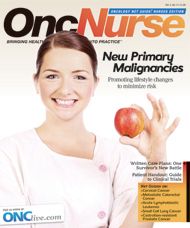First Annual NCONN Conference a Success
History was made on October 10th, when the National Coalition of Oncology Nurse Navigators (NCONN) held its first annual conference, Changing the Face of Cancer Care,which brought together nurses, social workers, and health care professionals from all over the United States and two Canadian provinces.
History was made on October 10th, when the National Coalition of Oncology Nurse Navigators (NCONN) held its first annual conference, “Changing the Face of Cancer Care,” which brought together nurses, social workers, and health care professionals from all over the United States and two Canadian provinces. The conference marked the first time that oncology nurse navigators and social workers were able to gather together to network and learn from industry leaders about the emerging discipline of patient navigation. The number of attendees and enthusiasm of the speakers made evident that this conference was groundbreaking in recognizing the importance of nurse navigators in improving the experience of patients with cancer.
The NCONN leadership recognizes that the universe of patient navigation in oncology nursing is growing exponentially as more cancer centers, hospitals, and medical centers are seeing the value in this specialty. Because nurses play a crucial role in patient navigation, NCONN planned its first national conference to provide oncology nurse navigators with a forum to voice their concerns, share ideas and experiences, learn, network, and express support to one another.
The keynote speaker was Harold P. Freeman, MD, founder and director of the Patient Navigation Institute in New York and president and founder of the Ralph Lauren Center for Cancer Care and Prevention. As past president of the American Cancer Society, Dr Freeman commissioned a research study looking at the critical issue of disparities in cancer care among the poor and underserved. He is widely known as “the Father of patient navigation” for developing the groundbreaking model of patient navigation, which has become the model that all cancer care professionals should strive to achieve. Dr Freeman eloquently described his work in Harlem, New York, and how his efforts resulted in the women in Harlem having the opportunity to significantly improve their chances of surviving breast cancer. Dr Freeman’s presence at the conference was the highlight of the day.
Steven Patierno, PhD, director of the George Washington Cancer Center in Washington, D.C., and principal investigator for the NCI Center to Reduce Cancer Health Disparities Patient Navigator Research Project (PNRP), spoke about the challenges of creating an integrative model for city-wide patient navigation in Washington, describing in detail the fragmentation of breast health services in our nation’s capital. He also outlined the goals of the PNRP in identifying ways to overcome these barriers.
Amy Sebastian-Deutsch, DNP, RN, CNS, OCN, gave a presentation on “Dollar$ and Sense: Navigator Data Collection That Matters.” Deutsch addressed the importance of data collection in the individual navigation setting and the critical need to measure patient outcomes, relative to metrics such as time from diagnosis to treatment, patient satisfaction, and revenue generation. The take- home message from Deutsch’s presentation was that data collection is key to the success of any navigation program.
Colleen Lemoine, APRN, MN, AOCN, presented “Finding Safe Harbor for You as You Navigate for Others.” Lemoine made a poignant and pointed case for the oncology nurse navigator to acknowledge the possibility of burnout, understand what it looks like, and take steps to avoid it. Although Lemoine’s presentation was funny and lighthearted, it conveyed a serious message to all healthcare professionals: it is critical for caregivers to take time to care for themselves.
NCONN co-founder and treasurer, Sharon Francz, BS, ONN, described the key components of navigation that every nurse navigator needs to establish to grow their program. Francz shared her successes in creating the navigation program at Shady Grove Adventist Hospital in Rockville, Maryland.
The final session was a highly successful interactive dialogue among attendees, during which a wealth of information was exchanged with discussions on topics such as third-party payer reimbursement strategies and patient management tools. This session was networking as it is meant to be, with open sharing of knowledge and experience.
NCONN is already at work planning the second annual conference. We’d love to hear your ideas for topics and speakers, as your needs are the inspiration for our organization. You may send an e-mail to tbeerman@nconn.org.
Tina Evans, RN, BS, is president and co-founder of the National Coalition of Oncology Nurse Navigators.
